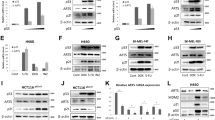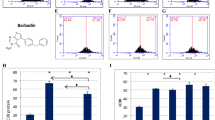Abstract
Our previous studies have shown that β-arrestin 2 plays an anti-apoptotic effect. However, the mechanisms by which β-arrestin contribute to anti-apoptotic role remain unclear. In this study, we show that a deficiency of either β-arrestin 1 or β-arrestin 2 significantly increases serum deprivation (SD)-induced percentage of apoptotic cells. β-arrestin 2 deficient-induced apoptosis was inhibited by transfection with β-arrestin 2 full-length plasmid, revealing that SD-induced apoptosis is dependent on β-arrestin 2. Furthermore, in the absence of either β-arrestin 1 or β-arrestin 2 significantly enhances SD-induced the level of pro-apoptotic proteins, including cleaved caspase-3, extracellular-signal regulated kinase 1/2 (ERK1/2) and p38, members of mitogen-activated protein kinases (MAPKs). In addition, a deficiency of either β-arrestin 1 or β-arrestin 2 inhibits phosphorylation of Akt. The SD-induced changes in cleaved caspase-3, ERK1/2 and p38 MAPKs, Akt, and apoptotic cell numbers could be blocked by double knockout of β-arrestin 1/2. Our study thus demonstrates that β-arrestin inhibits cell apoptosis through pro-apoptotic ERK1/2 and p38 MAPKs and anti-apoptotic Akt signaling pathways.






Similar content being viewed by others
Abbreviations
- KO:
-
Knockout
- DKO:
-
Double knockout
- SD:
-
Serum deprivation
- TUNEL:
-
Terminal deoxynucleotidyl transferase biotin dUTP nick end labeling
- ERK1/2:
-
Extracellular-signal regulated kinase 1/2
- MAPKs:
-
Mitogen-activated protein kinases
References
Kovacs JJ, Hara MR, Davenport CL, Kim J, Lefkowitz RJ (2009) Arrestin development: emerging roles for beta-arrestins in developmental signaling pathways. Dev Cell 17:443–458
Wang P, Gao H, Ni Y, Wang B, Wu Y, Ji L, Qin L, Ma L, Pei G (2003) Beta-arrestin 2 functions as a G-protein-coupled receptor-activated regulator of oncoprotein Mdm2. J Biol Chem 278:6363–6370
Reiter E, Lefkowitz RJ (2006) GRKs and beta-arrestins: roles in receptor silencing, trafficking and signaling. Trends Endocrinol Metab 17:159–165
Lymperopoulos A, Bathgate A (2012) Pharmacogenomics of the heptahelical receptor regulators G-protein-coupled receptor kinases and arrestins: the known and the unknown. Pharmacogenomics 13:323–341
Ma L, Pei G (2007) Beta-arrestin signaling and regulation of transcription. J Cell Sci 120:213–218
Lymperopoulos A (2012) Beta-arrestin biased agonism/antagonism at cardiovascular seven transmembrane-spanning receptors. Curr Pharm Des 18:192–198
Lefkowitz RJ, Shenoy SK (2005) Transduction of receptor signals by beta-arrestins. Science 308:512–517
Revankar CM, Vines CM, Cimino DF, Prossnitz ER (2004) Arrestins block G protein-coupled receptor-mediated apoptosis. J Biol Chem 279:24578–24584
Povsic TJ, Kohout TA, Lefkowitz RJ (2003) Beta-arrestin1 mediates insulin-like growth factor 1 (IGF-1) activation of phosphatidylinositol 3-kinase (PI3K) and anti-apoptosis. J Biol Chem 278:51334–51339
Luan B, Zhang Z, Wu Y, Kang J, Pei G (2005) Beta-arrestin2 functions as a phosphorylation-regulated suppressor of UV-induced NF-kappaB activation. EMBO J 24:4237–4246
Sun X, Zhang Y, Wang J, Wei L, Li H, Hanley G, Zhao M, Li Y, Yin D (2010) Beta-arrestin 2 modulates resveratrol-induced apoptosis and regulation of Akt/GSK3β pathways. Biochim Biophys Acta 1800:912–918
Xie N, Li H, Wei D, LeSage G, Chen L, Wang S, Zhang Y, Chi L, Ferslew K, He L, Chi Z, Yin D (2010) Glycogen synthase kinase-3 and p38 MAPK are required for opioid-induced microglia apoptosis. Neuropharmacology 59:444–451
Yin D, Woodruff M, Zhang Y, Whaley S, Miao J, Ferslew K, Zhao J, Stuart C (2006) Morphine promotes jurkat cell apoptosis through pro-apoptotic FADD/P53 and anti-apoptotic PI3K/Akt/NF-kappaB pathways. J Neuroimmunol 174:101–107
Chang L, Karin M (2001) Mammalian MAP kinase signalling cascades. Nature 410:37–40
Ichijo H (1999) From receptors to stress-activated MAP kinases. Oncogene 18:6087–6093
Tegeder I, Geisslinger G (2004) Opioids as modulators of cell death and survival—unraveling mechanisms and revealing new indications. Pharmacol Rev 56:351–369
Porras A, Zuluaga S, Black E, Valladares A, Alvarez AM, Ambrosino C, Benito M, Nebreda AR (2004) P38 alpha mitogen-activated protein kinase sensitizes cells to apoptosis induced by different stimuli. Mol Biol Cell 15:922–933
Cagnol S, Chambard JC (2010) ERK and cell death: mechanisms of ERK-induced cell death—apoptosis, autophagy and senescence. FEBS J 277:2–21
Murphy LO, Blenis J (2006) MAPK signal specificity: the right place at the right time. Trends Biochem Sci 31:268–275
Li Y, Sun X, Zhang Y, Huang J, Hanley G, Ferslew KE, Peng Y, Yin D (2009) Morphine promotes apoptosis via TLR2, and this is negatively regulated by beta-arrestin 2. Biochem Biophys Res Commun 378:857–861
Hetman M, Cavanaugh JE, Kimelman D, Xia Z (2000) Role of glycogen synthase kinase-3 beta in neuronal apoptosis induced by trophic withdrawal. J Neurosci 20:2567–2574
Eom TY, Roth KA, Jope RS (2007) Neural precursor cells are protected from apoptosis induced by trophic factor withdrawal or genotoxic stress by inhibitors of glycogen synthase kinase 3. J Biol Chem 282:22856–22864
Li Y, Li H, Zhang Y, Sun X, Hanley GA, LeSage G, Sun S, Peng Y, Yin D (2010) Toll-like receptor 2 is required for opioids-induced neuronal apoptosis. Biochem Biophys Res Commun 391:426–430
He L, Li H, Chen L, Miao J, Jiang Y, Zhang Y, Xiao Z, Hanley G, Li Y, Zhang X, LeSage G, Peng Y, Yin D (2011) Toll-like receptor 9 is required for opioid-induced microglia apoptosis. PLoS One 6:e18190
Mazumder S, Plesca D, Almasan A (2008) Caspase-3 activation is a critical determinant of genotoxic stress-induced apoptosis. Methods Mol Biol 414:13–21
Beaulieu JM, Gainetdinov RR, Caron MG (2007) The Akt-GSK-3 signaling cascade in the actions of dopamine. Trends Pharmacol Sci 28:166–172
Beaulieu JM, Sotnikova TD, Marion S, Lefkowitz RJ, Gainetdinov RR, Caron MG (2005) An Akt/beta-arrestin 2/PP2A signaling complex mediates dopaminergic neurotransmission and behavior. Cell 122:261–273
Scheid MP, Woodgett JR (2001) PKB/AKT: functional insights from genetic models. Nat Rev Mol Cell Biol 2:760–768
Moore CA, Milano SK, Benovic JL (2007) Regulation of receptor trafficking by GRKs and arrestins. Annu Rev Physiol 69:451–482
Buchanan FG, DuBois RN (2006) Emerging roles of beta-arrestins. Cell Cycle 5:2060–2063
Wang X, Martindale JL, Liu Y, Holbrook NJ (1998) The cellular response to oxidative stress: influences of mitogen-activated protein kinase signalling pathways on cell survival. Biochem J 333(Pt 2):291–300
Huot J, Houle F, Rousseau S, Deschesnes RG, Shah GM, Landry J (1998) SAPK2/p38-dependent F-actin reorganization regulates early membrane blebbing during stress-induced apoptosis. J Cell Biol 143:1361–1373
De Zutter GS, Davis RJ (2001) Pro-apoptotic gene expression mediated by the p38 mitogen-activated protein kinase signal transduction pathway. Proc Natl Acad Sci USA 98:6168–6173
Aoki H, Kang PM, Hampe J, Yoshimura K, Noma T, Matsuzaki M, Izumo S (2002) Direct activation of mitochondrial apoptosis machinery by c-Jun N-terminal kinase in adult cardiac myocytes. J Biol Chem 277:10244–10250
Tang D, Wu D, Hirao A, Lahti JM, Liu L, Mazza B, Kidd VJ, Mak TW, Ingram AJ (2002) ERK activation mediates cell cycle arrest and apoptosis after DNA damage independently of p53. J Biol Chem 277:12710–12717
Pearson G, Robinson F, Beers Gibson T, Xu BE, Karandikar M, Berman K, Cobb MH (2001) Mitogen-activated protein (MAP) kinase pathways: regulation and physiological functions. Endocr Rev 22:153–183
Liu X, Li Q, Dowdell K, Fischer ER, Cohen JI (2012) Varicella-zoster virus ORF12 protein triggers phosphorylation of ERK1/2 and inhibits apoptosis. J Virol 86:3143–3151
Ahn S, Kim J, Hara MR, Ren XR, Lefkowitz RJ (2009) {Beta}-arrestin-2 mediates anti-apoptotic signaling through regulation of BAD phosphorylation. J Biol Chem 284:8855–8865
Osaki M, Oshimura M, Ito H (2004) PI3K-Akt pathway: its functions and alterations in human cancer. Apoptosis 9:667–676
Acknowledgments
This work was supported in part by Shanghai Technology Department to Q. Li. The authors wish to express their appreciation to Dr. Robert Lefkowitz, Duke University Medical School, for providing WT MEFs, β-arrestin 1 or 2 KO MEFs, and β-arrestin 1/2 DKO MEFs and to Dr. Gang Pei, Shanghai Institutes for Biological Science of China, for providing β-arrestin 2 full-length plasmid and control plasmid.
Conflict of interest
The authors declare that they have no conflict of interest.
Author information
Authors and Affiliations
Corresponding authors
Rights and permissions
About this article
Cite this article
Yang, X., Zhou, G., Ren, T. et al. β-Arrestin prevents cell apoptosis through pro-apoptotic ERK1/2 and p38 MAPKs and anti-apoptotic Akt pathways. Apoptosis 17, 1019–1026 (2012). https://doi.org/10.1007/s10495-012-0741-2
Published:
Issue Date:
DOI: https://doi.org/10.1007/s10495-012-0741-2




